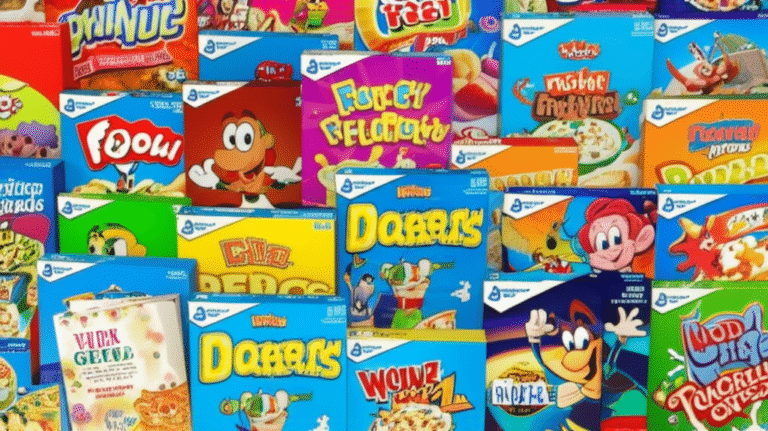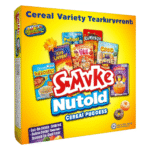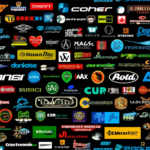Support our educational content for free when you purchase through links on our site. Learn more
The 25 Most Popular Brands in the World (2025) 🌍
Ever wondered what makes a brand truly popular across the globe? It’s not just about flashy logos or catchy slogans — it’s about emotional connection, relentless innovation, and the ability to evolve with changing times. From tech titans like Apple and Microsoft to timeless icons like Coca-Cola and Disney, these brands have mastered the art of staying relevant and beloved for decades.
In this deep dive, we uncover the secrets behind the world’s top 25 brands in 2025, reveal surprising shifts in brand rankings over the years, and share expert insights on what the future holds. Curious how a jewelry brand like Pandora cracked the top 100? Or why some giants vanished while others soared? Stick around — the answers might just change how you see your favorite brands forever.
Key Takeaways
- Longevity and emotional connection are key drivers of brand popularity — only a handful of brands have stayed in the top 10 for 25 years.
- Technology dominates the brand landscape, but legacy brands like Coca-Cola and Toyota continue to thrive through adaptation.
- The future belongs to brands that are relevant, differentiated, and resonate deeply with consumers across cultures and platforms.
- Digital presence and social media fluency are essential for building and maintaining brand popularity today.
- Consumer trust and brand loyalty form the foundation of enduring success, turning customers into lifelong advocates.
Ready to explore the full list and learn how these brands built their empires? Let’s dive in!
Table of Contents
- ⚡️ Quick Tips and Facts About Popular Brands
- 🏛️ The Evolution and History of Popular Brands: From Local to Global Giants
- 🌍 Top 25 Best Global Brands of 2024: Who’s Leading the Pack?
- 1. Apple: Innovation and Iconic Design
- 2. Microsoft: Powering Productivity Worldwide
- 3. Amazon: The E-Commerce and Cloud Titan
- 4. Google: The Search Engine That Changed Everything
- 5. Samsung: Tech Innovation from Smartphones to Appliances
- 6. Toyota: Reliability Meets Sustainability
- 7. Coca-Cola: The Classic Refreshment Brand
- 8. Mercedes-Benz: Luxury and Engineering Excellence
- 9. McDonald’s: Fast Food with Global Reach
- 10. BMW: Driving Performance and Prestige
- 11. Louis Vuitton: The Pinnacle of Luxury Fashion
- 12. Tesla: Revolutionizing Electric Vehicles
- 13. Cisco: Networking the World
- 14. Nike: Just Do It – The Sportswear Giant
- 15. Instagram: Visual Storytelling Powerhouse
- 16. Disney: Magic, Media, and Merchandising
- 17. Adobe: Creativity Unleashed
- 18. Oracle: Enterprise Software Leader
- 19. IBM: Legacy of Innovation and AI
- 20. SAP: Business Software Solutions
- 21. Facebook (Meta): Social Media and Beyond
- 22. Hermès: Timeless Luxury and Craftsmanship
- 23. Chanel: Haute Couture and Iconic Fragrance
- 24. YouTube: The Video Sharing Giant
- 25. J.P. Morgan: Financial Powerhouse
- 💎 Spotlight: Alexander Lacik, CEO & President of Pandora – Breaking Into the Top 100
- 📊 What 25 Years of Brand Analysis Reveals About the Future of Business
- 🔄 Trends and Shifts: How Popular Brands Adapt to Changing Markets
- 🛠️ Building a Popular Brand: Strategies and Secrets from the Experts
- 🤝 The Role of Consumer Trust and Brand Loyalty in Popularity
- 🌐 Digital Presence and Social Media Impact on Brand Popularity
- 📈 Measuring Brand Value: Metrics, Rankings, and Reports
- 🔒 Privacy and Ethics: Navigating Consumer Data in Popular Branding
- 📅 Previous Years’ Brand Rankings: A Look Back at Changing Leaders
- 🧠 Expert Views and Consumer Insights on Brand Popularity
- 💡 Quick Tips for Choosing and Trusting Popular Brands
- 🔗 Recommended Links for Brand Enthusiasts
- 📚 Reference Links and Sources
- 🎯 Conclusion: What Makes a Brand Truly Popular?
Hey brand aficionados! Welcome to Popular Brands™, where we, a team of seasoned brand reviewers, spill the tea on the logos you love and the names you trust. Ever wondered what makes a brand stick? Why you’ll gladly queue for an Apple product or why the jingle for McDonald’s lives in your head rent-free? You’ve come to the right place! We’re diving deep into the psychology, strategy, and sheer magic behind the world’s most popular brands. Ready to explore What Are the 25 Most Popular Brands in the World? 🌎 (2025)? Let’s get started!
⚡️ Quick Tips and Facts About Popular Brands
Before we unravel the stories behind the giants, let’s arm you with some killer facts. Think of this as your branding cheat sheet!
- Longevity is Rare: Over the last 25 years, 185 brands have appeared in Interbrand’s prestigious “Best Global Brands” ranking. A whopping 85 have since disappeared, including household names like Kodak and Nokia.
- The Unshakeable Few: Only 35 brands have managed to stay on that list consistently. Even more impressive? Only Microsoft and Coca-Cola have remained in the Top 10 for the entire 25-year period. Talk about staying power!
- Tech Dominates: The modern brand landscape is ruled by tech. In 2000, the top 10 was a mix of industries, including beverages, energy, and automotive. Today, tech giants like Apple, Microsoft, Amazon, and Google hold the top spots, showcasing a massive shift in market dynamics.
- Brand Value is BIG Money: A short-sighted focus on operational efficiency over brand strategy has cost the world’s most valuable brands an estimated $3.5 trillion in cumulative brand value over the past quarter-century. That’s not just pocket change!
- Emotion Drives Connection: The most successful brands build an emotional attachment with you. It’s not just about the product; it’s about how the brand makes you feel—whether it’s the pride of wearing some new athletic clothing from Nike or the nostalgia of a Disney movie.
🏛️ The Evolution and History of Popular Brands: From Local to Global Giants
Have you ever wondered where the idea of a “brand” even came from? It’s a tale as old as time, or at least as old as cattle ranching!
From “Brandr” to Billboards
The word “brand” comes from the Old Norse “brandr,” which means “to burn.” Way back when, people would literally burn a mark onto their livestock to show ownership. Fast forward through medieval guilds marking their goods to prove quality, and you land in the Industrial Revolution. This is where things really kicked off. With mass production, companies suddenly needed a way to make their soap, soup, and everything else stand out from the competition.
The Rise of the Brand Manager
By the 1950s, with the explosion of TV and radio, branding became a true art form. Companies like Procter & Gamble pioneered the role of the “brand manager,” whose entire job was to create a unique identity and emotional connection for a product. This was the era of iconic mascots and jingles that wormed their way into our collective consciousness. It was no longer just about what the product did; it was about the story it told.
The Digital Disruption
Then, the internet happened. The turn of the millennium was dominated by the dot-com bubble, and brands like Nokia and Yahoo! were on top of the world. But as we all know, the digital landscape is relentless. Brands that couldn’t adapt, like Kodak, faded away, while new giants like Google and Amazon rose to take their place. Today, a brand’s success is inextricably linked to its digital presence, its social media engagement, and its ability to navigate the ever-changing expectations of a connected world.
🌍 Top 25 Best Global Brands of 2024: Who’s Leading the Pack?
Alright, this is the moment you’ve been waiting for! We’re pulling back the curtain on the titans of industry. Based on Interbrand’s 2024 Best Global Brands report, here are the champions of the brand world.
1. Apple: Innovation and Iconic Design 🍎
For the 11th year in a row, Apple holds the crown. It’s more than a tech company; it’s a cultural phenomenon. From the sleek design of the iPhone to the seamless ecosystem, Apple has mastered the art of creating desire. They don’t just sell products; they sell a lifestyle.
👉 Shop Apple on: Amazon | Walmart | Apple Official Website
2. Microsoft: Powering Productivity Worldwide 💻
One of only two brands to stay in the top 10 for 25 years, Microsoft is the definition of endurance. It’s the silent partner in our work lives, the engine behind countless businesses, and a giant in cloud computing and AI.
👉 Shop Microsoft on: Amazon | Walmart | Microsoft Official Website
3. Amazon: The E-Commerce and Cloud Titan 📦
From a humble online bookstore to the “everything store,” Amazon’s rise has been meteoric. It has fundamentally changed how we shop, read, and even watch TV. Its relentless focus on customer convenience is its secret sauce.
👉 Shop Amazon on: Amazon | Walmart | Amazon Official Website
4. Google: The Search Engine That Changed Everything 🔍
Can you even imagine a world without Google? It has become a verb, the gateway to the internet, and an indispensable tool in our daily lives. Its mission to organize the world’s information has made it one of the most powerful brands on the planet.
👉 Shop Google Products on: Amazon | Walmart | Google Store Official Website
5. Samsung: Tech Innovation from Smartphones to Appliances 📱
A true global powerhouse, Samsung is a relentless innovator. From cutting-edge smartphones that challenge Apple to smart refrigerators that manage your groceries, Samsung’s technological breadth is staggering.
👉 Shop Samsung on: Amazon | Walmart | Samsung Official Website
6. Toyota: Reliability Meets Sustainability 🚗
Toyota has built its legendary reputation on one word: reliability. It’s the car you can count on. Now, as a leader in hybrid technology, it’s proving that dependability and sustainability can go hand-in-hand.
👉 Shop Toyota Parts & Accessories on: Amazon | Walmart | Toyota Official Website
7. Coca-Cola: The Classic Refreshment Brand🥤
The other titan of tenacity, Coca-Cola has been a top-10 brand for a quarter of a century. It’s more than a drink; it’s a taste of nostalgia, a symbol of happiness, and a masterclass in marketing.
👉 Shop Coca-Cola on: Amazon | Walmart | Coca-Cola Official Website
8. Mercedes-Benz: Luxury and Engineering Excellence 🌟
“The best or nothing.” That tagline says it all. Mercedes-Benz represents the pinnacle of automotive luxury and engineering. It’s a symbol of status, performance, and timeless elegance.
👉 Shop Mercedes-Benz Accessories on: Amazon | Walmart | Mercedes-Benz Official Website
9. McDonald’s: Fast Food with Global Reach 🍟
The Golden Arches are one of the most recognized symbols on Earth. McDonald’s has perfected the art of consistency, delivering the same familiar taste and experience whether you’re in Moscow or Mumbai.
👉 Shop McDonald’s Merchandise on: Amazon | Walmart | McDonald’s Official Website
10. BMW: Driving Performance and Prestige 🏎️
The “Ultimate Driving Machine.” BMW has carved out its space by focusing on performance, handling, and the sheer joy of driving. It’s a brand for those who don’t just want to get from A to B, but want to enjoy the journey.
👉 Shop BMW Accessories on: Amazon | Walmart | BMW Official Website
11. Louis Vuitton: The Pinnacle of Luxury Fashion 👜
A symbol of opulence and craftsmanship, Louis Vuitton is a leader in the resilient luxury sector. Its iconic monogram is a statement of style and exclusivity, recognized and coveted worldwide.
👉 Shop Louis Vuitton on: Louis Vuitton Official Website
12. Tesla: Revolutionizing Electric Vehicles ⚡
Tesla didn’t just build an electric car; it made electric cars cool. Led by the enigmatic Elon Musk, Tesla has disrupted the entire automotive industry and accelerated the world’s transition to sustainable energy.
👉 Shop Tesla Accessories on: Amazon | Walmart | Tesla Official Website
13. Cisco: Networking the World 🌐
You might not see it, but Cisco is everywhere. It’s the backbone of the internet, the plumbing that connects us all. For businesses and governments, Cisco is the essential brand for secure and reliable networking.
👉 Shop Cisco Products on: Amazon | Walmart | Cisco Official Website
14. Nike: Just Do It – The Sportswear Giant ✔️
Just Do It. Three simple words that created a global empire. Nike is a master of branding, associating itself with top athletes and inspirational stories of overcoming adversity. It’s not just selling shoes; it’s selling motivation.
👉 Shop Nike on: Amazon | Walmart | Nike Official Website
15. Instagram: Visual Storytelling Powerhouse 📸
The picture-perfect social media platform. Instagram has changed how we share our lives, discover trends, and connect with brands. Its focus on visual aesthetics has made it a cultural force and an essential marketing tool.
Check out Instagram: Instagram Official Website
16. Disney: Magic, Media, and Merchandising 🏰
The happiest brand on Earth! From classic animated films to sprawling theme parks and a massive media empire, Disney has been creating core memories for generations. It’s a brand built on storytelling and magic.
👉 Shop Disney on: Amazon | Walmart | Disney Official Website
17. Adobe: Creativity Unleashed 🎨
For creatives, Adobe is the language they speak. Photoshop, Illustrator, Premiere Pro—these aren’t just software; they’re the essential tools for designers, photographers, and filmmakers worldwide.
👉 Shop Adobe on: Amazon | Walmart | Adobe Official Website
18. Oracle: Enterprise Software Leader ☁️
A titan in the world of business software and cloud technology. Oracle’s databases and enterprise solutions are the powerful, unseen forces that help the world’s largest companies run efficiently.
Learn more about Oracle: Oracle Official Website
19. IBM: Legacy of Innovation and AI 💡
“Big Blue” has a storied history of innovation, from the first mainframes to the cutting edge of AI with Watson. IBM has consistently reinvented itself, remaining a trusted partner for businesses navigating technological change.
Learn more about IBM: IBM Official Website
20. SAP: Business Software Solutions 📈
Another giant in the enterprise software space, SAP helps businesses of all sizes manage their operations and customer relations. Its software is critical for supply chains, financials, and human resources across the globe.
Learn more about SAP: SAP Official Website
21. Facebook (Meta): Social Media and Beyond metaverse
The original social network that connected the world. Now under the Meta umbrella, Facebook is looking towards the future with its big bets on the metaverse, virtual reality, and the next generation of social connection.
Check out Facebook: Facebook Official Website
22. Hermès: Timeless Luxury and Craftsmanship 🧡
The epitome of high-fashion luxury. Known for its exquisite craftsmanship, from the iconic Birkin bag to its silk scarves, Hermès represents a commitment to quality and timeless style that few can match.
👉 Shop Hermès on: Hermès Official Website
23. Chanel: Haute Couture and Iconic Fragrance 🖤
A name synonymous with Parisian chic. From the “little black dress” to the legendary Chanel No. 5 perfume, the brand has been a defining force in fashion and beauty for over a century.
👉 Shop Chanel on: Chanel Official Website
24. YouTube: The Video Sharing Giant ▶️
The world’s second-largest search engine and the undisputed king of online video. YouTube has democratized content creation, turning everyday people into global stars and changing how we learn, laugh, and entertain ourselves.
Check out YouTube: YouTube Official Website
25. J.P. Morgan: Financial Powerhouse 💰
A global leader in investment banking, financial services, and asset management. J.P. Morgan is a cornerstone of the global financial system, a brand built on a long history of trust and financial expertise.
Learn more about J.P. Morgan: J.P. Morgan Official Website
💎 Spotlight: Alexander Lacik, CEO & President of Pandora – Breaking Into the Top 100
Breaking into the top 100 most valuable brands is no small feat. That’s why we’re tipping our hats to Pandora and its CEO, Alexander Lacik, for making their debut on the prestigious Interbrand list.
So, what’s their secret? According to Lacik, it’s about owning a unique space in the consumer’s mind. He notes that while many jewelry brands focus on styling, Pandora has carved out a niche in “jewelry with meaning.” Think about it: their famous charm bracelets aren’t just accessories; they’re collections of memories, milestones, and personal stories. This emotional connection is incredibly powerful.
Lacik, a self-described “brilliant marketer and brand architect,” has been instrumental in revitalizing the brand by focusing on this core identity. His strategy proves that in a crowded market, having a clear, emotionally resonant idea is key to standing out and building a beloved brand.
📊 What 25 Years of Brand Analysis Reveals About the Future of Business
Looking back at a quarter-century of brand rankings from Interbrand offers some juicy insights into where business is heading. It’s not just a history lesson; it’s a crystal ball.
One of the most startling takeaways is the cost of short-term thinking. Interbrand’s analysis suggests that a hyper-focus on “operational efficiencies and short-term gains” has led to a staggering loss of potential brand value. The brands that thrive are the ones that invest in their identity, their story, and their relationship with customers for the long haul.
The game has also fundamentally changed. As one report notes, “Competing on product and price alone is so last century.” In an age of endless choice, the strongest brands win by transcending their categories. Think of how Apple moved from computers to music and phones, or how Amazon expanded from books to… well, everything. These “Multi-Arena brands” build such strong relationships with customers that people will follow them into new spaces.
The future belongs to brands that are relevant, differentiated, and resonant. They don’t just sell a product; they play a meaningful role in consumers’ lives.
🔄 Trends and Shifts: How Popular Brands Adapt to Changing Markets
The brands that stay on top are masters of adaptation. They have an uncanny ability to ride the waves of cultural and technological change. Here are some of the key trends they’re navigating right now:
- Sustainability and Social Responsibility: Today’s consumers, especially younger generations, expect brands to do more than just make a profit. They want companies to take a stand on social and environmental issues. Brands like Patagonia have built immense loyalty by embedding their values into their business practices.
- Digital Transformation: This is more than just having a website. It’s about creating seamless, personalized experiences across all digital touchpoints. From AI-powered recommendations to engaging social media content, brands are using technology to build deeper relationships.
- The Experience Economy: It’s no longer enough to just sell a product; you have to sell an experience. Whether it’s the magical atmosphere of a Disney park or the sleek, minimalist vibe of an Apple Store, successful brands are creating immersive worlds for their customers.
- Authenticity and Transparency: Consumers are savvy. They can spot a fake from a mile away. Brands that are honest, transparent, and true to their values are the ones that earn trust and long-term loyalty.
🛠️ Building a Popular Brand: Strategies and Secrets from the Experts
So, you want to build the next Nike or Coca-Cola? While there’s no magic formula, the most popular brands all share a commitment to a few core principles.
Key Pillars of a Strong Brand:
- A Clear Brand Identity: This is more than just a logo. It’s your brand’s personality, voice, and values. A strong identity is consistent across every single thing you do, from your packaging to your social media posts.
- Compelling Storytelling: Humans are wired for stories. The best brands tell captivating stories that create an emotional connection. Think of Nike’s tales of athletic triumph or Disney’s timeless fables.
- Unwavering Consistency: Whether it’s the taste of a Coke or the user-friendly interface of a Google product, consistency builds trust and reliability. Customers know what to expect, and that familiarity breeds loyalty.
- Customer-Centricity: Popular brands are obsessed with their customers. They listen to feedback, anticipate needs, and constantly strive to improve the customer experience. Amazon’s success is a testament to the power of putting the customer first.
- Differentiation: In a crowded marketplace, you have to stand out. What makes you unique? Why should a customer choose you over the competition? The most valuable brands have a clear and compelling answer to that question.
🤝 The Role of Consumer Trust and Brand Loyalty in Popularity
Why do you always buy the same brand of toothpaste or feel a sense of pride when you use your favorite laptop? It all comes down to trust and loyalty.
Trust is the foundation of any strong brand-consumer relationship. It’s built over time through consistent performance, quality products, and honest communication. When a brand keeps its promises, we learn to rely on it.
This trust blossoms into loyalty, which is the holy grail for any brand. Brand loyalty means customers will choose you over and over again, even if a competitor offers a lower price. They become advocates, recommending you to friends and family. This creates a powerful cycle of growth driven by genuine affection for the brand. It’s the difference between a one-time purchase and a lifelong relationship.
🌐 Digital Presence and Social Media Impact on Brand Popularity
In the 21st century, if your brand isn’t online, does it even exist? The rise of the internet and social media has completely rewritten the rules of branding.
Platforms like Instagram, YouTube, and Facebook (Meta) have become arenas where brand reputations are built or broken. They offer a direct line of communication to billions of consumers, allowing brands to:
- Engage in Real-Time: Brands can now have two-way conversations with their customers, responding to feedback and participating in cultural moments as they happen.
- Tell Visual Stories: Platforms like Instagram are perfect for creating a strong visual identity and showcasing products in a compelling, aspirational way.
- Leverage Influencers: By partnering with creators who have already built trust with an audience, brands can reach new customers in an authentic way.
- Gather Data and Insights: Social media is a treasure trove of consumer data, helping brands understand what their audience cares about and how they can better serve them.
The most popular brands today are not just using social media; they are fluent in its language, creating content that is engaging, shareable, and true to their identity.
📈 Measuring Brand Value: Metrics, Rankings, and Reports
Ever wonder how experts put a dollar value on something as intangible as a brand? It’s a complex process, but firms like Interbrand have developed sophisticated methodologies to do just that.
Interbrand’s valuation model, one of the most respected in the industry, rests on three key pillars:
- Financial Performance: This looks at the raw economic profit generated by the branded products or services. It’s the bottom-line contribution of the brand.
- Role of Brand: This analyzes how much the brand itself influences a customer’s purchase decision, separate from factors like price or features. For a luxury item like a Chanel bag, the role of the brand is huge. For a more commoditized product, it might be less.
- Brand Strength: This is a forward-looking measure of the brand’s ability to create loyalty and sustainable demand in the future. Interbrand evaluates this across ten different factors, including clarity, commitment, and relevance.
By combining these analyses, they can forecast a brand’s future earnings and calculate its net present value, giving us the eye-popping numbers you see in the annual rankings.
🔒 Privacy and Ethics: Navigating Consumer Data in Popular Branding
In the digital age, data is the new oil. Brands use consumer data to personalize experiences, target advertising, and develop new products. However, this power comes with immense responsibility.
The world’s biggest tech brands—Apple, Google, Amazon, and Meta (Facebook)—are at the heart of the global conversation about privacy. High-profile data breaches and debates over data collection practices have made consumers more aware and cautious than ever.
Navigating this landscape is one of the biggest challenges for modern brands. The key is finding the right balance:
- ✅ Transparency: Being open and honest about what data is being collected and how it’s being used.
- ✅ Value Exchange: Ensuring that if a consumer shares their data, they receive a tangible benefit in return, like a more personalized service or relevant offers.
- ❌ Overstepping Boundaries: Avoiding intrusive or “creepy” uses of data that erode consumer trust.
Brands that prioritize ethics and respect user privacy will be the ones that build the strongest, most enduring relationships in the years to come.
📅 Previous Years’ Brand Rankings: A Look Back at Changing Leaders
Looking at past brand rankings is like opening a time capsule. It reveals so much about our changing world, technology, and tastes.
Let’s take a peek at the top 5 brands from 2013, according to a study from that time, and see how things have shifted.
| Rank (2013) | Brand | Rank (2024) |
|---|---|---|
| 1 | The Walt Disney Company | 16 |
| 2 | Yahoo! | Not in Top 100 |
| 3 | 4 | |
| 4 | Sony | Not in Top 100 |
| 5 | Nestle | Not in Top 100 |
What a difference a decade makes! The complete disappearance of brands like Yahoo! and Sony from the top echelon is a stark reminder of how quickly the mighty can fall. Meanwhile, the enduring power of Google and Disney shows their incredible ability to adapt and stay relevant. This look back underscores a critical lesson: in the world of branding, you’re either evolving or you’re becoming obsolete.
🧠 Expert Views and Consumer Insights on Brand Popularity
To get the full picture of brand popularity, we need to look at it from two angles: the analytical view of experts and the emotional pulse of consumers.
The Expert View (Interbrand): Experts like Interbrand focus on the strategic and financial components of brand value. They emphasize that a brand is a critical business asset that drives growth. Their key takeaway is that brands that are managed strategically—those that are clear, relevant, and differentiated—consistently outperform their competitors and even the market as a whole.
The Consumer View (YouGov, APCO): Consumer-focused data, like that from YouGov, reveals what the world actually thinks and feels about brands. Studies that measure consumer emotions find that the most “loved” brands are those that connect on a deeper level. They evoke feelings of pride, admiration, relevance, and trust. A brand like Disney might top a “most loved” list because it connects to our childhood memories and values, demonstrating that popularity is often a matter of the heart, not just the head.
Ultimately, both perspectives are crucial. A brand needs a solid financial and strategic foundation to succeed, but it will only become truly popular if it captures the hearts and minds of consumers.
💡 Quick Tips for Choosing and Trusting Popular Brands
With so many brands vying for your attention, how do you choose the right ones for you? Here are a few quick tips from our team:
- Look Beyond the Hype: A popular brand isn’t automatically the best choice for everyone. Consider your personal needs and values. Does the brand align with what’s important to you?
- Do Your Homework: Read reviews from multiple sources. See what real customers are saying, not just what the brand’s marketing department wants you to hear.
- Understand Their Values: In today’s world, a brand’s stance on social and environmental issues can be a major factor. Support brands that are making a positive impact.
- Test the Waters: Whenever possible, try before you make a big commitment. Whether it’s a test drive for a new bike or a sample of a new product, personal experience is the best judge.
- Trust Your Gut: Sometimes, a brand just feels right. If a brand consistently delivers a great product and a positive experience, it has likely earned your trust.
🔗 Recommended Links for Brand Enthusiasts
Can’t get enough of the fascinating world of brands? Here are some essential resources to continue your journey:
- Interbrand’s Best Global Brands Report: The definitive source for brand rankings and in-depth analysis. Dive into their methodology and explore the full list of the top 100 brands.
- YouGov Brand Rankings: Get a pulse on public opinion with YouGov’s real-time popularity rankings, based on surveys from millions of people.
- Visual Capitalist – Animated Brand Rankings: Watch the rise and fall of the world’s biggest brands over the last two decades in this fascinating animated chart.
📚 Reference Links and Sources
For this article, we consulted a variety of expert sources and reports to bring you the most accurate and comprehensive information. Our primary sources include the annual Best Global Brands report from Interbrand, consumer insights from YouGov, and historical analysis from various marketing and business publications. We believe in transparency and providing you with the resources to explore these topics further.
🎯 Conclusion: What Makes a Brand Truly Popular?
After our whirlwind tour through the glittering world of popular brands, one thing is crystal clear: popularity is no accident. It’s the result of decades of strategic vision, relentless innovation, emotional connection, and the ability to evolve with the times. From the iconic Apple logo to the golden arches of McDonald’s, these brands have mastered the art of storytelling, consistency, and customer trust.
We’ve seen how giants like Microsoft and Coca-Cola have stood the test of time, while disruptors like Tesla and Instagram have rewritten the rules of engagement. The secret sauce? Brands that are relevant, differentiated, and resonate deeply with consumers. They don’t just sell products; they create experiences, evoke emotions, and become part of our identities.
If you’re wondering whether to jump on the bandwagon of a popular brand or build your own, remember: it’s about more than just recognition. It’s about building trust, delivering consistent value, and connecting authentically with your audience. And yes, social media and digital presence are your best friends in this journey.
So, next time you reach for that Nike sneaker or stream a Disney classic, you’ll know there’s a fascinating story behind that brand — one built on passion, strategy, and a relentless pursuit of excellence. Ready to explore more? Dive into our recommended links below and keep your brand savvy sharp!
🔗 Recommended Links for Brand Enthusiasts
Looking to explore or shop some of the world’s most popular brands? We’ve got you covered with direct links to browse and buy!
- Apple Products: Amazon | Walmart | Apple Official Website
- Microsoft Software & Devices: Amazon | Walmart | Microsoft Official Website
- Amazon Devices & More: Amazon | Walmart | Amazon Official Website
- Google Pixel & Devices: Amazon | Walmart | Google Store
- Samsung Electronics: Amazon | Walmart | Samsung Official Website
- Toyota Accessories: Amazon | Walmart | Toyota Official Website
- Coca-Cola Merchandise: Amazon | Walmart | Coca-Cola Official Website
- Mercedes-Benz Accessories: Amazon | Walmart | Mercedes-Benz Official Website
- McDonald’s Merchandise: Amazon | Walmart | McDonald’s Official Website
- BMW Accessories: Amazon | Walmart | BMW Official Website
- Louis Vuitton: Louis Vuitton Official Website
- Tesla Accessories: Amazon | Walmart | Tesla Official Website
- Nike Products: Amazon | Walmart | Nike Official Website
- Disney Merchandise: Amazon | Walmart | Disney Official Website
- Adobe Software: Amazon | Walmart | Adobe Official Website
- Hermès: Hermès Official Website
- Chanel: Chanel Official Website
Recommended Books on Branding:
- “Building a StoryBrand” by Donald Miller — Amazon Link
- “How Brands Grow” by Byron Sharp — Amazon Link
- “Brand Gap” by Marty Neumeier — Amazon Link
FAQ
What are the top popular brands in 2024?
The top popular brands in 2024, according to Interbrand’s Best Global Brands report, include tech giants like Apple, Microsoft, Amazon, Google, and Samsung, as well as enduring leaders like Toyota, Coca-Cola, and Mercedes-Benz. These brands dominate due to their innovation, global reach, and emotional connection with consumers. For a full list, check our detailed Top 25 Best Global Brands of 2024 section.
Which brands are most trusted by consumers?
Brands like Microsoft, Coca-Cola, Toyota, and Apple consistently rank high in consumer trust due to their track record of quality, transparency, and customer service. Trust is built over time through consistent delivery and ethical practices. According to YouGov’s consumer sentiment data, brands that align with social responsibility and privacy concerns also gain significant trust.
How do popular brands maintain their market dominance?
Popular brands maintain dominance by:
- Innovating continuously to stay relevant
- Building emotional connections through storytelling and experiences
- Investing in digital transformation and social media engagement
- Ensuring consistent quality and customer service
- Adapting to cultural and market shifts, such as sustainability and inclusivity
This multi-pronged approach ensures they don’t just survive but thrive.
What makes a brand popular worldwide?
A brand becomes popular worldwide by being relevant across cultures, offering consistent quality, and creating emotional resonance. Global brands like Coca-Cola and Nike have mastered localization while maintaining a strong core identity. Digital presence and social media amplify their reach, making them household names everywhere.
Which industries have the most popular brands?
The most popular brands come from:
- Technology (Apple, Microsoft, Google)
- Automotive (Toyota, Mercedes-Benz, BMW)
- Consumer Goods and Beverages (Coca-Cola, Nike)
- Luxury Fashion (Louis Vuitton, Chanel, Hermès)
- Media and Entertainment (Disney, YouTube, Instagram)
These sectors have high consumer engagement and global appeal.
How can small businesses become popular brands?
Small businesses can build popularity by:
- Defining a clear, authentic brand identity
- Telling compelling stories that connect emotionally
- Delivering exceptional customer experiences
- Leveraging social media and digital marketing to reach niche audiences
- Focusing on consistency and quality to build trust and loyalty
Even giants like Nike started small — your story matters!
What role does social media play in popular brand growth?
Social media is a game-changer for brand growth. It allows brands to:
- Engage directly with customers in real-time
- Tell visual and interactive stories
- Leverage influencer partnerships for authentic reach
- Gather valuable consumer insights and feedback
Brands fluent in social media language build stronger, more engaged communities.
What are the emerging popular brands to watch this year?
Keep an eye on brands like Pandora, which recently broke into Interbrand’s Top 100, thanks to its emotional storytelling and niche focus. Also, tech startups in AI, sustainable fashion brands, and innovative health and wellness companies are gaining traction rapidly. The future belongs to brands that combine purpose with innovation.
📚 Reference Links and Sources
- Interbrand Best Global Brands 2024: https://interbrand.com/best-global-brands/
- YouGov Brand Popularity Data: https://today.yougov.com/ratings/consumer/popularity/brands/all
- Apple Official Website: https://www.apple.com/
- Microsoft Official Website: https://www.microsoft.com/en-us/
- Amazon Official Website: https://www.aboutamazon.com/
- Google Store: https://store.google.com/
- Samsung Official Website: https://www.samsung.com/us/
- Toyota Official Website: https://www.toyota.com/
- Coca-Cola Company: https://www.coca-colacompany.com/
- Mercedes-Benz USA: https://www.mbusa.com/en/home
- McDonald’s USA: https://www.mcdonalds.com/us/en-us.html
- BMW USA: https://www.bmwusa.com/
- Louis Vuitton: https://us.louisvuitton.com/eng-us/homepage
- Tesla Official Website: https://www.tesla.com/
- Nike Official Website: https://www.nike.com/
- Disney Official Website: https://www.disney.com/
- Adobe Official Website: https://www.adobe.com/
- Hermès Official Website: https://www.hermes.com/us/en/
- Chanel Official Website: https://www.chanel.com/us/
- Pandora Official Website: https://us.pandora.net/
- YouGov: https://today.yougov.com/
- Visual Capitalist Brand Rankings: https://www.visualcapitalist.com/cp/animated-most-valuable-brands-from-2000-2022/
Dive deeper into the fascinating world of brands with Interbrand’s full report: BGB – Interbrand.
Thanks for joining us on this brand adventure! Stay curious, stay savvy, and keep loving the brands that make life a little more exciting. 🚀







